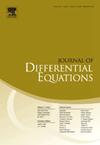The optimal time-decay estimates for 2-D inhomogeneous Navier-Stokes equations
IF 2.4
2区 数学
Q1 MATHEMATICS
引用次数: 0
Abstract
In this paper, we derive the optimal time-decay estimates for 2-D inhomogeneous Navier-Stokes equations. In particular, we prove that as for any if initially . This is optimal even for the classical homogeneous Navier-Stokes equations. Different with Schonbek and Wiegner's Fourier splitting device, our method here seems more direct, and can adapt to many other equations as well. Moreover, our method allows us to work in the -based spaces.
二维非均质纳维-斯托克斯方程的最佳时间衰减估计值
本文推导了二维非均质纳维-斯托克斯方程的最优时间衰减估计。特别是,我们证明了 "u(t) "B˙p,1θ(R2)=O(t1p-32-θ2) as t→∞ for any p∈[2,∞[,θ∈[0,2] if initially ρ0u0∈B˙2,∞-2(R2) if initially ρ0u0∈B˙2, ∞-2(R2)。即使对于经典的均质纳维-斯托克斯方程来说,这也是最优的。与 Schonbek 和 Wiegner 的傅立叶分裂装置不同,我们的方法似乎更直接,也能适用于许多其他方程。此外,我们的方法允许我们在基于 Lp 的空间中工作。
本文章由计算机程序翻译,如有差异,请以英文原文为准。
求助全文
约1分钟内获得全文
求助全文
来源期刊
CiteScore
4.40
自引率
8.30%
发文量
543
审稿时长
9 months
期刊介绍:
The Journal of Differential Equations is concerned with the theory and the application of differential equations. The articles published are addressed not only to mathematicians but also to those engineers, physicists, and other scientists for whom differential equations are valuable research tools.
Research Areas Include:
• Mathematical control theory
• Ordinary differential equations
• Partial differential equations
• Stochastic differential equations
• Topological dynamics
• Related topics

 求助内容:
求助内容: 应助结果提醒方式:
应助结果提醒方式:


